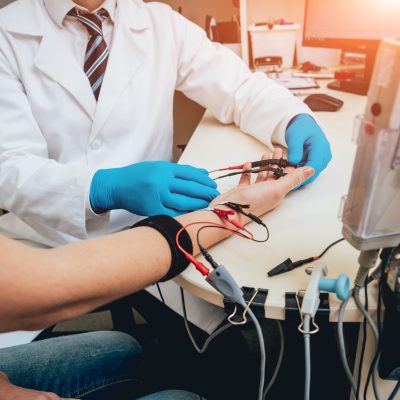What to Expect During your EMG Test
 Electrodiagnostic medicine is the study of diseases of nerves and muscles. If your doctor has recommended an EMG test to see if your muscles and nerves are working right, the following information will be helpful if you have any questions about your test. The results of the tests will help your doctor decide what is wrong and how it can be treated.
Electrodiagnostic medicine is the study of diseases of nerves and muscles. If your doctor has recommended an EMG test to see if your muscles and nerves are working right, the following information will be helpful if you have any questions about your test. The results of the tests will help your doctor decide what is wrong and how it can be treated.
Why am I being sent to the EMG lab for tests?
You are being sent to the electromyography (EMG) lab because you have numbness, tingling, pain, weakness or muscles cramping. Some of the tests that the EMG doctor may use to diagnose your symptoms are nerve conduction studies (NCSs), needle EMG and evoked potentials. The EMG doctor will examine you to decide which tests to do.
How long will these tests take?
The tests usually take 20 to 90 minutes. You can do any of your normal activities, like eating, driving and exercise, before the tests. There are no lasting side effects. You can also do your normal activities after the test.
Types of Tests
Needle EMG
For this part of the test, a small, thin needle is put in several muscles to see if there are any problems. It is used once for each patient and is thrown away after the test. There may be a small amount of pain during this part of the examination. The doctor tests only the muscles necessary to decide what is wrong. During the EMG test, the doctor will be able to hear and see how your muscles and nerves are working by the electrical signals made by your muscles to find the cause of the pain.
Nerve Conduction Studies
NCSs show how well the body’s electrical signals are traveling to a nerve. This is done by applying small electrical shocks to the nerve and recording how the nerve works. These shocks cause a quick, mild, tingling feeling. The doctor may test several nerves.
Evoked Potentials
Evoked potentials are painless tests that check the nerve pathways through the spinal cord or from the eyes and ears. The signals for these tests can come from small electrical shocks, light pulses, or clicks of sound in the ears. The nerve responses are recorded over the scalp and other areas of skin.




